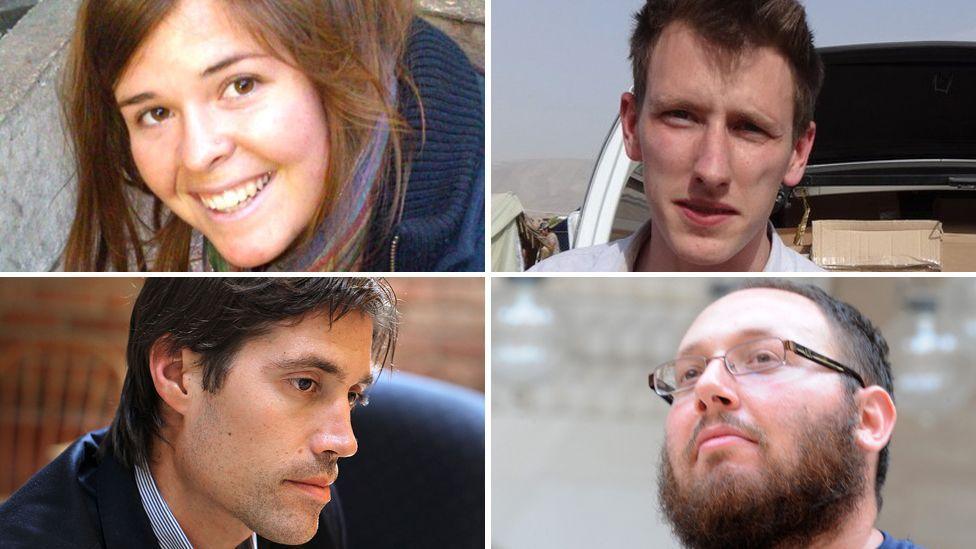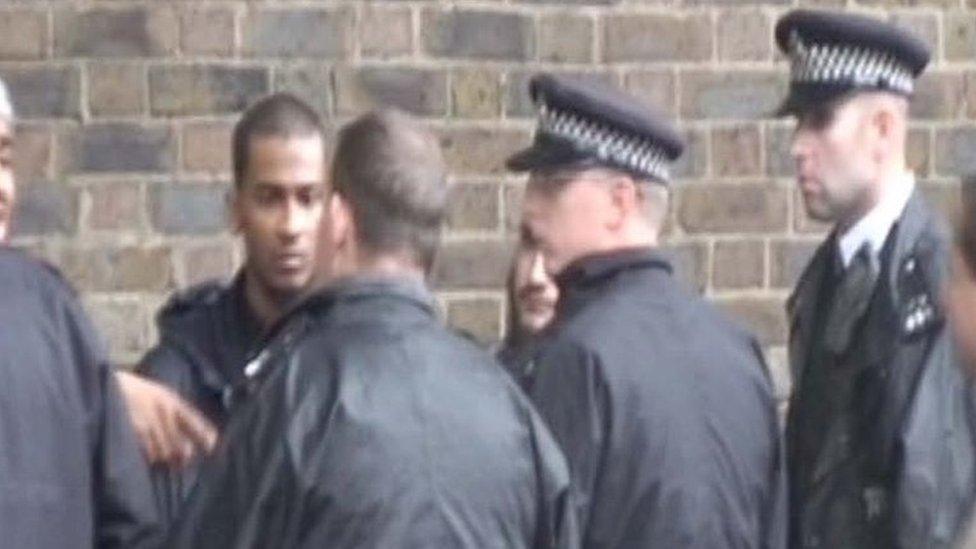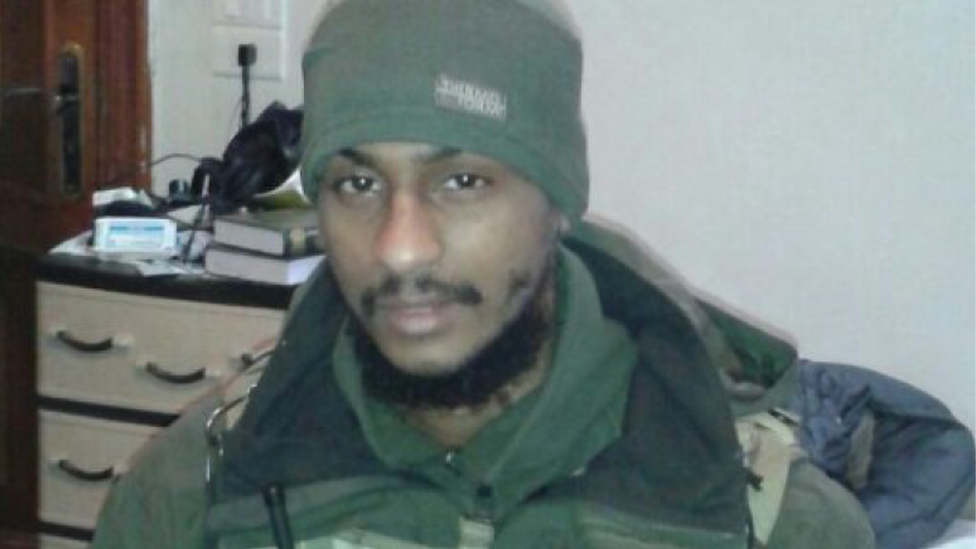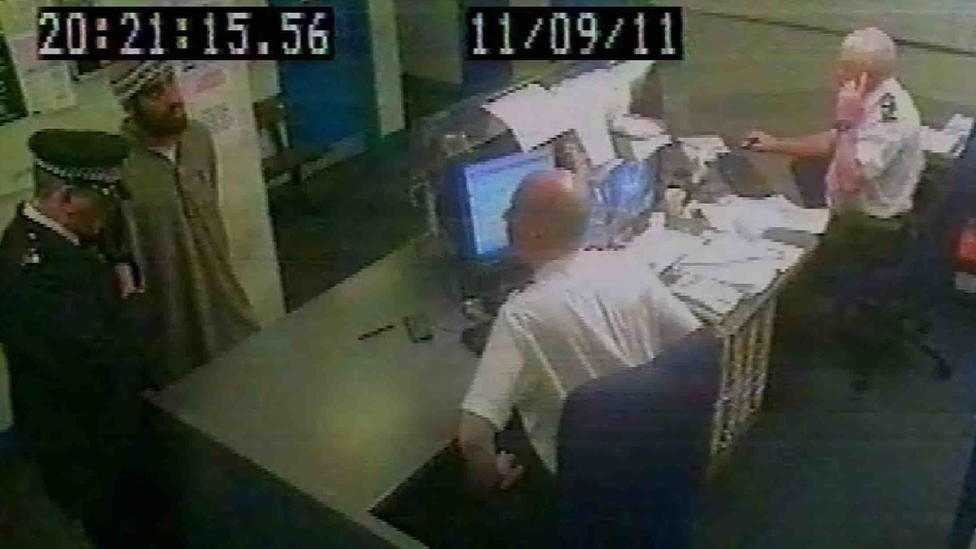Islamic State 'Beatles': How 2011 arrests led to convictions
- Published
Watch: Alexanda Kotey (left) and El Shafee Elsheikh were arrested at a demonstration in London in 2011
Hostages freed by the Islamic State terror cell, known as The Beatles, gave vital evidence to identify their captors, say police.
The hostages told British police the men had boasted of being arrested at a London demonstration years earlier.
Officers identified the protest and recovered video of El Shafee Elsheikh and Alexanda Kotey being arrested.
Analysis of their phones showed the pair's links to the cell's executioner, Mohammed Emwazi, or "Jihadi John".
The details were disclosed by Scotland Yard ahead of Elsheikh's sentencing in the United States on Friday.
Elsheikh was convicted in April of lethal hostage-taking and conspiracy to commit murder.
Co-defendant Alexanda Kotey pleaded guilty in September 2021 and was jailed for life.
'Colossal Investigation'
"This was an investigation into some truly horrific crimes," said Commander Richard Smith, head of Counter Terrorism Command.
He described it as a "truly colossal investigation", lasting eight years.
In November 2012, officers received reports of the kidnappings in northern Syria of British journalist John Cantlie, who is still missing, and American photo journalist James Foley
In 2014 the masked killer known as Jihadi John began a wave of recorded executions that sent shock waves across the globe
The group's actions resulted in the deaths of four US hostages - Mr Foley and fellow journalist Steven Sotloff plus aid workers Kayla Mueller and Peter Kassig.
It is also blamed for the deaths of British aid workers David Haines and Alan Henning, and Japanese journalists Haruna Yukawa and Kenji Goto.

Clockwise from top left: Aid workers Kayla Mueller and Peter Kassig, and journalists Steven Sotloff and James Foley
"These were some of the most shocking and barbaric acts that we've seen and they were carried out with chilling callousness and brutality," said Cdr Smith.
His officers were part of an international hunt to identify and bring to justice Jihadi John and his associates.
Cdr Smith described how their first breakthrough came from conversations with those hostages released by IS after ransoms were paid.
They disclosed how their masked captors, who were "at great pains to hide their identities", spoke of having been arrested at a demonstration against far-right group, the English Defence League, in 2011.
"Based on that snippet of conversation, our investigation team was able to go back and identify a particular EDL march in London on 11 September 2011," said Cdr Smith.

Video of Elsheikh being arrested at the September 2011 demonstration was a crucial piece of evidence
Police records and video showed Kotey and Elsheikh were part of a group that was arrested after reports of a stabbing at the march, but later released without charge.
"The information was invaluable in helping us zero in on them as being the men the hostages had described to us," said Cdr Smith.
It proved the two men had been associates before they went to Syria in 2012.
Data from their phones, which were seized when they were arrested, also revealed their contacts with Emwazi, who was killed in a drone strike in Syria in 2015.
The police also held on their records vital evidence against Emwazi.
He was questioned about a series of thefts in London in 2012 and his interviews with police were still on tape, Cdr Smith revealed.
Forensic voice analysis of these police interviews showed "a very strong likelihood" the recordings were of the same person as the masked executioner in the IS videos.
A further breakthrough came in an unrelated case when in 2014 Elsheikh's brother, Khalid, was arrested in an Operation Trident investigation into UK gun crime.
Digital interrogation analysis of Khalid's mobile phone revealed messages sent by Elsheikh from Syria on the encrypted Telegram platform.
They included an image of Elsheikh holding a firearm, which was used as evidence against him during his trial.

El Shafee Elsheikh is said to have earned a reputation for "waterboarding, mock executions, and crucifixions"
"These men thought they were beyond the reach of law" but were brought to justice following "a remarkable investigation" and thanks to the "fortitude and courage of the hostages who gave evidence against them," said Cdr Smith.
The pair were arrested and detained by Kurdish militia in Syria in January 2018 and were eventually sent for trial in the United States.
UK ministers had argued their best chance of conviction lay in them being tried in the US.

Kotey pictured inside the police station in London on 11 September 2011
In August 2020 the Supreme Court ruled that a stay preventing the Home Office from supplying intelligence against the men must be lifted after the US said it would drop death-penalty charges against them.
However, Cdr Smith disclosed that a file had been sent by his officers to the Crown Prosecution Service, after which the UK attorney general authorised 139 charges, including hostage-taking and kidnapping, against Elsheikh and Kotey.
Asked why these British men were not tried in the UK, he said: "Our job was to gather the evidence," adding that British detectives had been "delighted to support" the US prosecution.